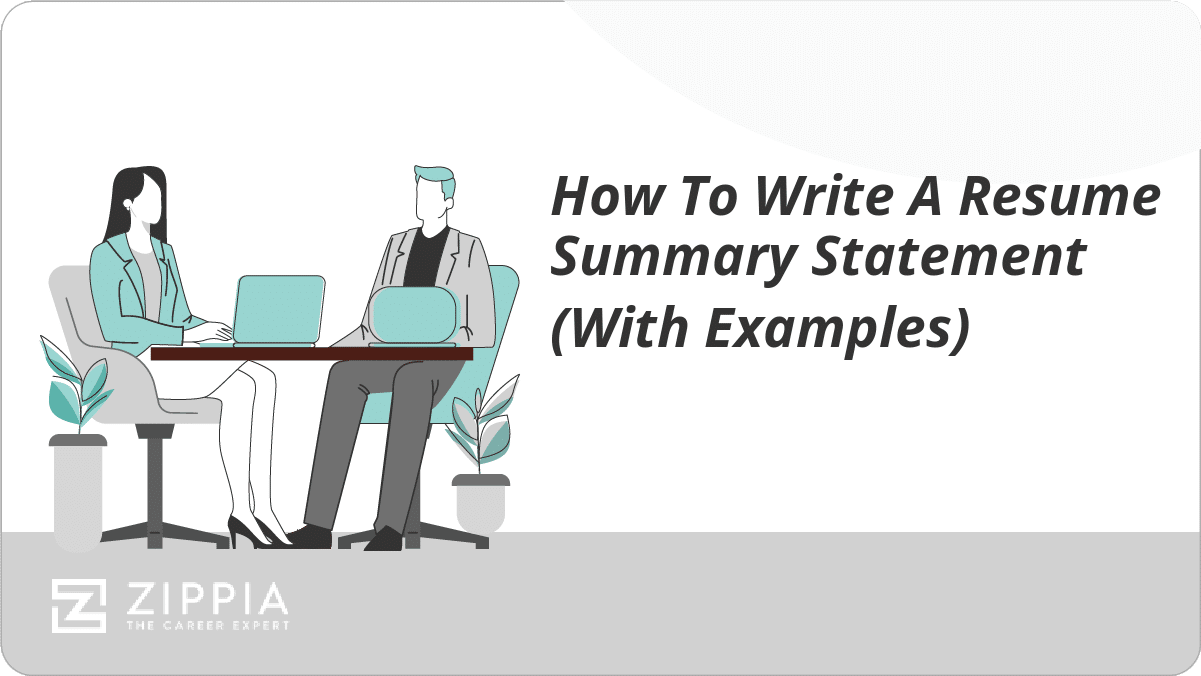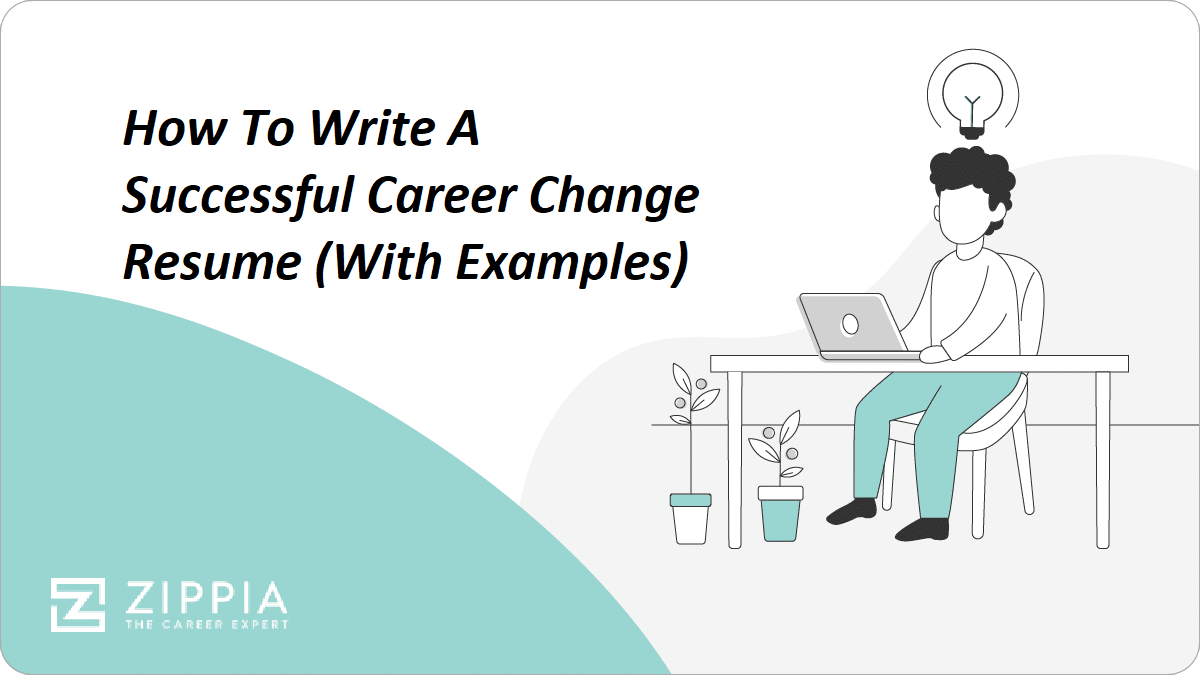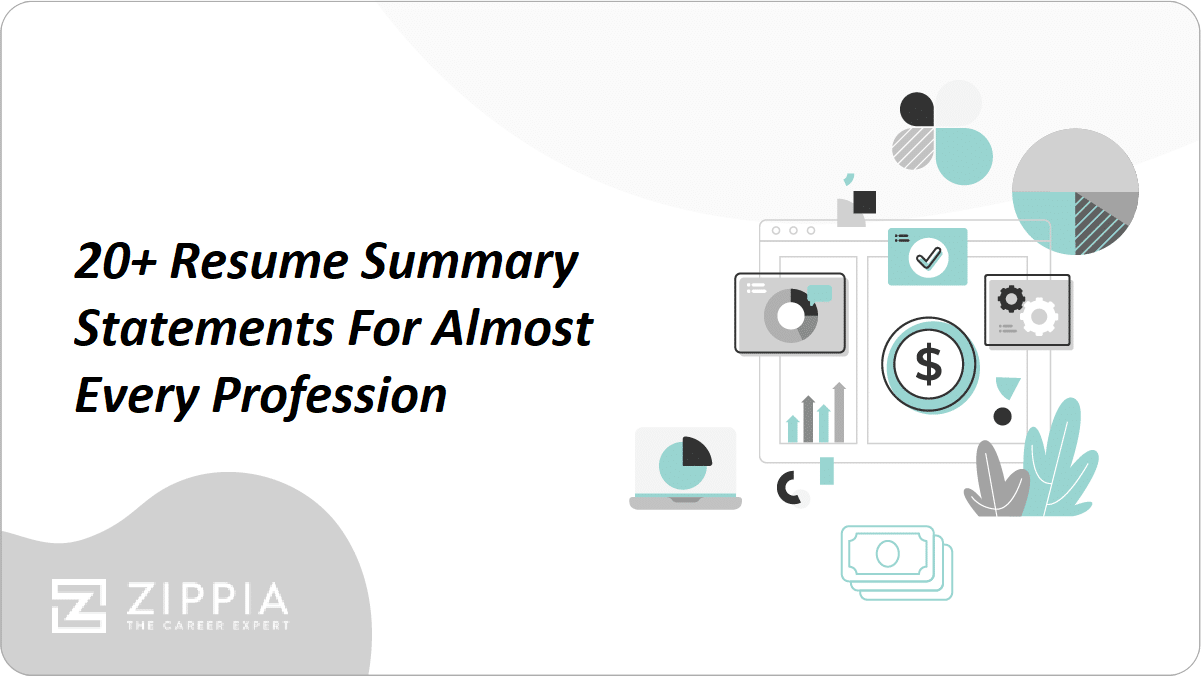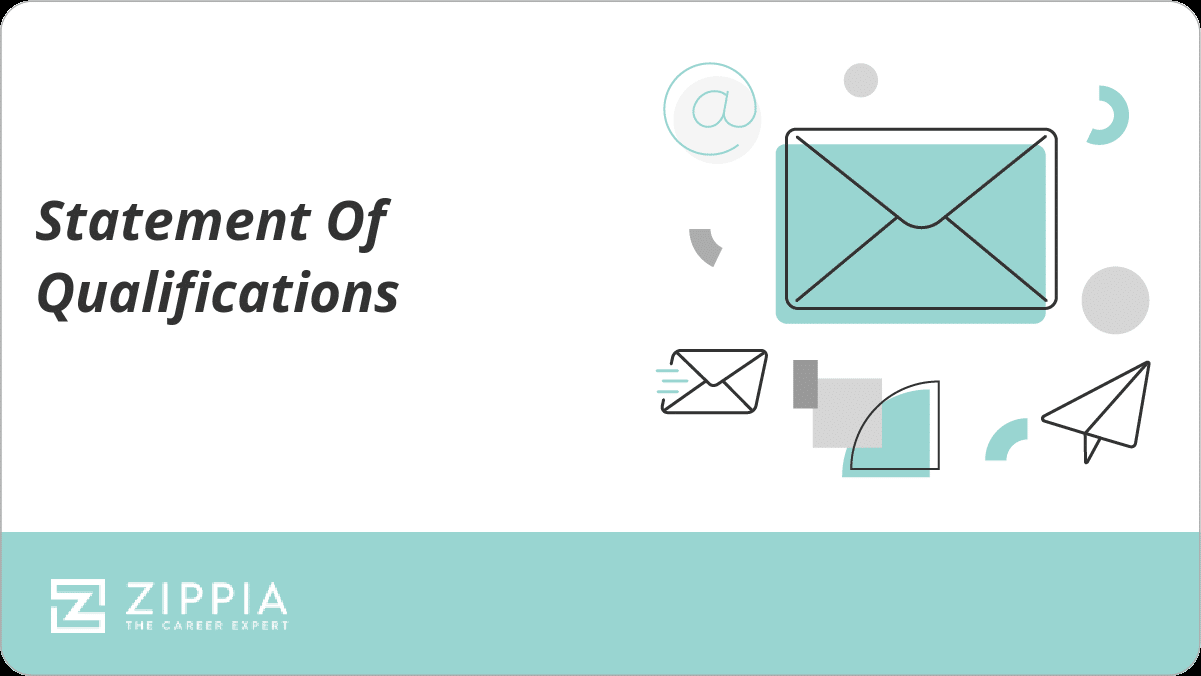- Parts Of A Resume
- How To Write A Resume
- Resume Skills Section
- Resume Objective Section
- Career Objective Section
- Resume Reference Section
- Resume Summary Section
- Resume Summary Example
- Resume Interests Section
- Address On Resume
- Relevant Work Experience
- Anticipated Graduation Date On Resume
- Education Section On Resume
- Contact Information On Resume
- Statement Of Qualifications
- How To List Publications On Resume
- Accomplishments On Resumes
- Awards On Resume
- Dean's List On Resume
- Study Abroad On Resume
A resume summary is a few sentences that explain who you are as a professional and why you’re the perfect fit for the position you’re applying to. It’s like having a hook on your resume to get the employer to keep reading. Resume summaries are also a summary of your career so that your employer has a snapshot of your experience.
If you’re considering adding a resume summary to your resume, want to rework a summary that you have, or want to change your objective statement into a summary, then you’ve come to the right place. Below there will be resume summary tips and tricks as well as several examples.
Key Takeaways
-
Tailor your resume summary statement to each position you apply for.
-
Your resume summary statement should focus on who you are as a professional — don’t try to fit in your entire resume.
-
Keep your resume summary statement to two to four lines long.
-
A resume summary statement is not the same thing as an objective statement.

- What is a resume summary statement?
- The benefits of a resume summary statement
- How to write a resume summary statement
- Resume summary statement examples
- The five W’s of a resume summary statement
- Resume summary statement vs. resume objective
- Final thoughts
- Resume summary statement FAQ
- References
- Ask the experts
- Sign Up For More Advice and Jobs
What is a resume summary statement?
A resume summary, sometimes called a professional summary or summary statement, is a brief overview of your experience and skills at the top of your resume. It’s often written in the form of 2 to 4 sentences, but it can be bullet points.
Resume summaries are a way to give the employer a basic overview of your career and skills before they read the rest of your resume. That’s why it’s important to customize this section as much as possible for each job you apply to as a way to showcase how well you fit the position.
The benefits of a resume summary statement
A resume summary statement can have several benefits, including making your resume stand out, capturing keywords, and putting key skills at the top. It may feel odd to include a pitch at the beginning of your resume, but remember that recruiters may read hundreds of resumes, which means that giving them the info upfront can help catch their attention.
Having a resume summary statement can help you by:
-
Making your resume stand out. Remember that recruiters spend their day reading resumes. A resume summary by itself may not be that remarkable, but a well-written and relevant one will show the recruiter that you paid attention and customized your application.
-
Using keywords. This is particularly important if the hiring company uses an ATS. Altering the summary at the beginning is a lot easier than altering your resume altogether, and it puts the keywords at the top.
-
Highlight key skills at the top. If there are certain skills that you want to draw the hiring manager’s attention to, then putting them at the top in the resume summary is a way to do that. It showcases that you have relevant skills and experience right away, making you a more attractive candidate.
-
Decide upon a title. This is the headline that sums you up. It’s pretty much the only part of your summary that is just about you. You should begin with a title that explains your professional identity, such as:
Capitalize each word. It’s a bonus if your title genuinely matches the position. Be precise and be honest – if you just graduated with a degree in business, you’re not a business analyst yet.
-
Research the company and the position. It should go without saying, but you need to know as much about this position as possible.
-
Read the job posting again. What words do they use to describe the company, the position, and the right applicant? Try to include any prominent keywords and qualities.
-
Look at the company’s website. Match any characteristics that repeat across their pages. If you found the job posted on a third-party site, is the job listing any different in their careers section?
-
Peruse other companies’ listings for similar positions. Similar traits should be desirable in similar positions. Don’t be shy about borrowing some of the terms and phrasing in other want ads.
-
-
Keep the summary brief. The average hiring manager will spend a matter of seconds glancing at a resume before they decide how to act. You want to make sure that it’s not a large block of text they’ll be tempted to skip over for an easier-to-digest snippet. Your resume summary should be:
-
Four to six bullet points
-
Two to four sentences
OR
-
-
Show how you’d be an asset. The job market is a seller’s market these days, so you need to make a quick, convincing case for why they should choose you.
Do not turn it into an objective statement by ending with something like “I hope to secure a ______ position with your company”.
-
List certifications, skills, and experience you can bring. Do your best to highlight ones that are relevant to the position. Not all of them need to be, though, so long as they showcase other valuable skills, such as diligence, attention to detail, or communication.
-
Mention relevant duties. There’s not a lot of space in the summary, so you want to make sure that what you put in it catches the recruiter’s eye. Mention duties that you were assigned that you’ll be doing in the new job – especially if it was something you excelled at.
-
Reference the rest of your resume. Try to list skills and traits that have supporting evidence in the rest of your resume. Look over what duties you performed at your previous jobs, as well as what commendations you received, and reference those in your summary.
Don’t steal your job descriptions’ thunder or be redundant, but think about anything you may have left over that didn’t make its way into the rest of your resume.
-
Have you streamlined a process and saved money? How much?
-
Do you have any achievements of note that you intend to repeat in this new position? Which?
-
Did you take any projects from inception to fruition? Did they add any value?
-
-
Some things to avoid. With a section this short, what you don’t put in it is almost more important than what you do. Here are some things to make sure you don’t put in your resume summary statement.
-
Lies or exaggerations. It can be tempting to inflate your qualifications, especially if you haven’t been getting any responses to your applications. But the consequences of this are greater than the gain, so be sure to avoid it.
-
Summarizing your whole resume. Despite the fact that it’s called a resume summary, it’s really a summary of you, not your resume. Don’t try to stuff everything in your resume into it – that’s what the resume itself is for. Just highlight your best and most relevant skills and qualifications.
-
Buzzwords. While including buzzwords in your resume itself isn’t inherently bad, getting too buzzwordy or using hackneyed terms in your summary is unlikely to catch the reader’s attention, so they just take up space.
-
Things you hate doing. You may be very skilled at tasks that you really dislike. If that’s the case, don’t put them in your summary. While you want to highlight your qualifications, you also don’t want to set yourself up to be assigned to do something that you despise.
-
-
Marketing Writer Example
A creative and experienced writer combines a background in technical writing and journalism with expertise in medical writing to deliver quality, customized content in diverse content media – public relations, content marketing, web content, and software manuals. Reliably meets deadlines and thrives in an agile, quick turnaround environment while providing sales support and client-oriented projects.
-
Administrative Office Coordinator Example
Adaptable, reliable, and expedient with more than three years of experience supporting managers and leadership in fast-paced workplaces. Versatile skills include human resources, recruiting, customer relations, project management, and administrative support. Expertise in managing online communications platforms and multiple phone lines.
-
Mergers and Acquisitions Executive Example
A tested leader of international holding companies offers 10 years of expertise in developing proven growth strategies, mentoring both individual representative and team leaders in product benefits and client service techniques. Also known for creating engaging marketing campaigns that capture markets in a variety of verticals. Effectively improves profits and losses reports through innovative Mamp;A operations.
-
Recent College Graduate Example
Dedicated Statistics major with proven mathematical and actuarial abilities. Graduated with a 4.0 GPA and award for Exceptional Research Project. Diligent Junior Actuary for XYZ Consultancy – increased efficiency of risk reports by 9% in first three months.
-
Sales Representative Example
Driven sales manager with over 6 years of experience driving profitability through team leadership, strategic growth, and process improvement. Increased customer satisfaction team-wide by an average of 4% annually while increasing sales by 22%.
-
Project Manager Example
Project manager with 10+ years of experience managing software projects, coordinating teams of 100+ subcontractors, and allocating and analyzing budgets. Managed a project budget of $20M while reducing costs by an average of 13% year-over-year.
-
Business Analyst Example
Highly-trained business analyst with more than 4 years of experience in business management, computer services, and order processing. Monitored accuracy of business process ordering, increasing efficiency by 12% from implementation to execution.
-
Customer Service Position Example
Customer service professional with a commitment to customer satisfaction while upholding corporate goals and branding.
-
Teacher Example
Spirited elementary school teacher with over ten years of childcare, tutoring, and teaching experience. Organized new curriculum and standardized test preparation, increasing reading scores by 8% in one year.
-
Retail Manager Example
Energetic retail associate with 6+ years of experience driving customer traffic and engagement through product knowledge and a friendly demeanor. Efficient in training customer service teams to provide the best experience for shoppers and staff.
-
College Student – English Example
English Literature student with leadership and academic training at the University of Rhode Island. Expertise in social media platforms and Microsoft Office. Proven experience in research projects, time management, and organizational skills with a background in office administration. Able to provide employers with administrative support and professional communication skills.
-
College Student – Biology Example
Biology major with demonstrated skills in research activities and clinical experiments. Blends academic training with lab management experience from Boston College. Incorporates administrative experience in an office setting to provide employers with proven scheduling, communications, and organizational expertise.
-
What is a resume summary statement? A resume statement summary is more or less just a few well-worded, targeted sentences that sum up your skills and experiences. Think of it as a shortened cover letter or a written elevator pitch.
-
Where does a resume summary statement go? At the top of your resume, just under your contact information. The purpose is to quickly grab the hiring manager’s notice as soon as they begin reading.
-
Why do I need a resume summary statement? To make sure the reader gets the gist of who you are as soon as possible. Imagine you’re a hiring manager skimming dozens of resumes – kind of like a jobseeker skimming dozens of resume templates.
Some employers run resumes through screening software, so this is an opportunity to stick some keywords in that don’t mesh with your job description bullet points.
-
Who needs a resume summary statement? A well-written resume statement can be to everyone’s benefit, so having one is generally recommended. However, there are certain instances where they’re more useful than others. Such as:
<
-
If you’ve got a lot of experience in your field, it summarizes your achievements.
-
If you’re making a change in industries, it ties together your experiences.
-
If you’re just starting out, it explains how your academic experience is relevant.
-
-
When don’t I need a resume summary statement? Resume statement summaries aren’t technically required, so it isn’t as though you can’t get away without one. If you’re struggling to craft an engaging and relevant summary statement, then it may be better to omit it altogether and make use of the space in some other way.
Some people may benefit from a resume objective statement instead. If you don’t have much experience to offer, for instance, you may be better off talking about what you’re looking for rather than what you’ve done.
-
How long should a resume summary statement be?
A resume summary statement should be about two to four lines long. Your summary should be short and to the point because it’s designed to grab readers’ attention, not bog them down with a list of every job you’ve had or your reasons for choosing your career.
-
Should I write a resume summary?
Yes, you should write a resume summary. Unless you have very little experience and can’t write a good resume summary, it’s generally a good idea to include one on your resume.
A solid resume summary sets your resume apart from the rest and gives hiring managers a sense of what you bring to the table right off the bat.
-
What’s an executive resume summary?
An executive resume summary is another name for a resume summary. Hiring managers may request an executive summary if you’re applying for a high-level or executive position.
They do this because having a summary of your experience makes it easier for them to sift through your extensive work history to find the most important pieces.
-
Columbia University for Career Education – How to Write a Resume Profile or Summary Statement
-
University of Arizona – Writing a Resume Summary Statement
How to write a resume summary statement
When writing a resume summary, you’re going to want to decide on a career title for yourself, research the company you’re applying to, and keep it brief. It’s important to remember that you’re selling yourself to the company you apply to, so your resume summary should make it clear why they should select you.
Follow our five-step method for how to write a resume summary statement:
Resume summary statement examples
The five W’s of a resume summary statement
You might be wondering about the who, what, when, where, and why of a resume summary statement. Resume summary statements can add additional polish to your resume, but you need to make sure you understand the resume summary’s purpose and how to write a good one.
Resume summary statement vs. resume objective
While there are a lot of similarities between resume summary statements and resume objectives, they aren’t the same. The way that they’re written and the purpose of them differ. Resume summary statements summarize your career and achievements in a few sentences, while an objectives statement talks about what you want to achieve.
So, you may be wondering: Is a resume summary statement or a resume objective statement better? The answer: it depends. Resume objective statements are considered old-fashioned by some nowadays, so it’s likely better to go with a resume summary statement. But that all depends on if you can write a good one.
Here’s an example resume objective
Copywriter seeking an opportunity to draw upon my skills in editing, graphic design, and content strategy to help increase company website traffic and drive B2B and B2C content engagement.
Resume objectives focus on your career goals and interest in the job you’re applying for. This is why there’s an argument that those who limited experience or who are changing career fields are better served by a resume objective.
A resume summary statement, on the other hand, looks like this:
Accomplished copywriter with over five years of experience in digital marketing, content strategy, and graphic design. Have increased organic search traffic by 43% year-over-year for the past three years through engaging B2B and B2C content.
Resume summary statements are focused more on your skills and experience, which means they’re more focused on selling you to the employer. That’s why in many ways they’re preferred by experts now, as emphasizing your skills is a way to show how you’ll be an asset to the recruiter’s organization.
Does that make a resume summary statement inherently superior? Not necessarily. Different recruiters will be looking for different things. Some experts even just recommend putting a list of skills at the top of your resume as a way to showcase your abilities.
Which one you choose to use will depend on the circumstances and how well your resume summary statement comes out. An unengaging or flat resume summary statement isn’t going to be better than a strong objective, a list of skills, or even just using more space in your experience section.
Final thoughts
A resume summary statement is a very short section at the top of your resume that can make a big impact on recruiters and hiring managers.
Whether you’re a job seeker with plenty of impressive and relevant experience or a recent graduate with hardly any, a resume summary statement puts your accomplishments front and center.
Taken together with a stellar cover letter, your resume summary statement allows employers to understand your professional experience more thoroughly.
Remember to make small adjustments to your resume summary statement depending on the employer and the job description.
With a tailored resume summary statement, you’re sure to get called for interviews more often.
Resume summary statement FAQ
References
Ask the experts
What’s a quick resume tip?
Tonia Derkos
Professional Resume Writing
My tip is to get rid of objectives — employers don’t care about your objective, they only care that you can fulfill their objective.
Instead, have a profile highlighting key strengths, skills, and accomplishments with concrete examples, such as percentages, goals achieved, and a proven track record of success.
- Parts Of A Resume
- How To Write A Resume
- Resume Skills Section
- Resume Objective Section
- Career Objective Section
- Resume Reference Section
- Resume Summary Section
- Resume Summary Example
- Resume Interests Section
- Address On Resume
- Relevant Work Experience
- Anticipated Graduation Date On Resume
- Education Section On Resume
- Contact Information On Resume
- Statement Of Qualifications
- How To List Publications On Resume
- Accomplishments On Resumes
- Awards On Resume
- Dean's List On Resume
- Study Abroad On Resume








